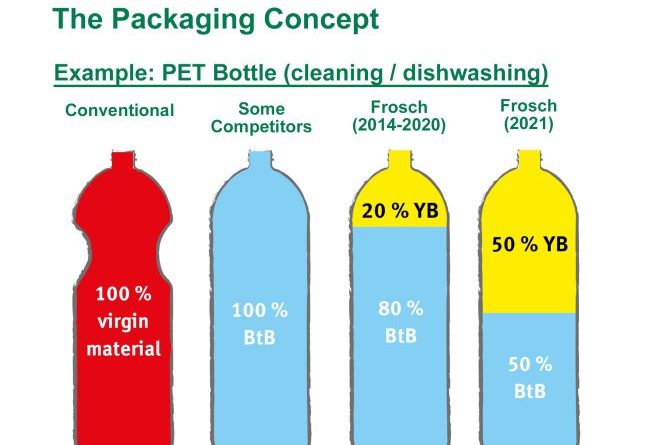Werner & Mertz makes a quantum leap in recycling
Cleaning products manufacturer increases rPET share in its bottles to 50% from Yellow Bag
A breakthrough for the circular economy is announced by Werner & Mertz. The Mainz-based manufacturer of detergents and cleaning products, together with its cooperation partner Alpla in the Recyclate Initiative, has increased the share of recyclates from the Yellow Bag in its product bottles to 50 percent. The first 200,000 bottles for the Frosch brand will be in use as of March 2021. By the end of the year, all PET bottles will be converted to the new composition.
Advanced mechanical recycling with fully automated system
Back in 2012 Werner & Mertz, Alpla and other cooperation partners along the entire supply chain brought the Recyclate Initiative to life. In their joint efforts since then, the collected used plastic known as “Post Consumer Recyclate” or “PCR” is reprocessed at high quality, used again and thus kept in a closed loop. In 2014 the Initiative succeeded in converting PET bottles for the well-known Frosch brand to 100 percent PCR, 20 percent of which came from the Yellow Bag. The remaining 80 percent was from the European beverage bottle collection system (Bottle to Bottle). More than 400 million such bottles have since been put on the market.
Werner & Mertz has long worked to raise the share of material obtained from the Yellow Bag. With the technology previously available, it was not possible to achieve the desired transparency with rPET. A decisive step forward was taken in October 2020 when the PET Recycling Team Wolfen GmbH got to work. More than 8 million EUR was invested in this joint venture established by Alpla and Fromm, the parent company of Team Wolfen. In the new recycling plant nearly everything is fully automated. The PET, delivered by trucks to Wolfen, comes from the Yellow Bag or Yellow Bin exclusively from German collection systems and plastic processors and goes through presorting in lightweight packaging equipment.
At the Wolfen site the transparent PET and coloured PET are separated. In this fine sorting, the focus is on PET hollow articles such as non-deposit PET bottles, PET bottles for household cleaners and plastic trays. The residual material is likewise separated. The high-quality fine sorting is an advanced development of Near Infrared (NIR) technology. In the next step Textplast GmbH turns the recovered material into transparent granules, which are then further processed by Alpla into preforms and bottles.
In this way the recyclable material from Germany is recycled in Germany and processed again into bottles for international companies. It is a completely national solution in which transport distances remain low. “Werner & Mertz is not just a long-term and valued customer for us, but also a catalyst for the entire industry. We hope that this example will motivate other companies to use high-quality recyclate. Everyone is talking about sustainable packaging. Together we are proving that it works,” says Georg Lässer, Head of Corporate Recycling for the Alpla Group. Reinhard Schneider, owner of Werner & Mertz, emphasised that the look and feel of the new bottles do not differ from the previous packaging. “The customer won’t notice a difference in the quality. We won’t say which format will be converted first. We did the same with the change to 20 percent from the Yellow Bag in order to see the reaction. Conclusion: none at all. No one noticed. For us that is the best proof that genuine sustainability is possible without giving something up or making half-hearted compromises.”
Demands for statutory incentives for the use of PCR
The example shows that high-quality sorting technologies are available and the quality of the recyclate is high. Why then is Werner & Mertz practically alone in using recyclate from the Yellow Bag? Schneider says, “The high costs of recyclate compared to virgin plastic still scare away many manufacturers. This problem has been made worse by the declining price of crude oil. If the demand for high-quality recyclate does not grow, there is no reason to invest in better sorting and processing as Alpla has just done in a big way. And yet, recycling will become more economical as more companies get involved. It’s an enormous opportunity.” That’s why Werner & Mertz is demanding that lawmakers create financial incentives for the use of PCR, which would effectively counteract the trashing of our planet and achieve the goal of a climate-friendly circular economy for plastic. Werner & Mertz advocates setting up a fund system to which all companies that bring plastic packaging to market would contribute. Those who use Post Consumer Recyclate would then receive a reimbursement.

